Rod Dreher's Blog, page 211
September 5, 2019
Slovakia Postcard
Hello from Bratislava. It has been a busy week, and I haven’t had access to WiFi for a couple of days. I have only a short time to check in and update you on what’s happening. I hope to be able to approve comments later tonight.
I took a slow train across Austria two days ago, and really couldn’t believe how beautiful that country is. As we pulled into Vienna Hauptbanhof, I thought, “The Habsburgs chose a gorgeous country to rule for 800 years.”
I got off the train, came down from the platform to the station … and ran into my friend Eduard Habsburg, the Hungarian ambassador to the Holy See, who was about to take a train to Budapest. Imagine being in Vienna for the first time ever, and there for only two minutes when you bump into a Habsburg archduke! It really happened. See here:
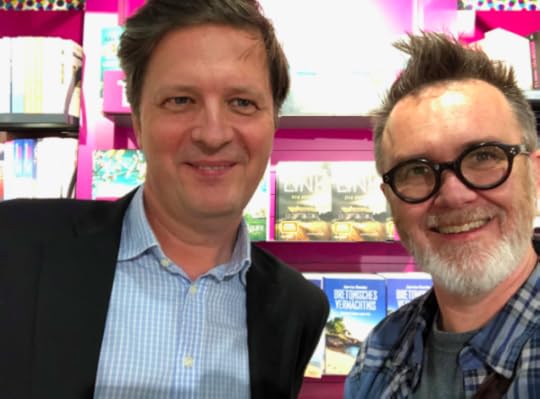
At the station, Father Niall (left) and Father Petar (right) picked me up. They were my hosts. They are priests in the Family of Mary order; their priestly brother, Father Thomas Sauter, invited me to their parish in Lustenau, Austria; part two of my journey with them was to be in Nitra, Slovakia, where the Family of Mary has a mission house. The priests and I drove to Nitra, where I met some of the nuns of the order. There was an overwhelming sense of peace at the modest compound the order has in a Nitra suburb. This is palpably a place where people pray. Tucked away in my little cabin in the back garden, I slept two of the most peaceful nights I’ve had in recent memory.
I had a couple of meals with the sisters. We talked about faith, and our lives. Most of them teach in a local Catholic school. There’s one American sister among them, Sister Mary Nichole Nietzel, from Muscatine, Iowa. She’s a cook, and we had a fine time talking about kitchen things. She baked homemade cinnamon rolls for us:
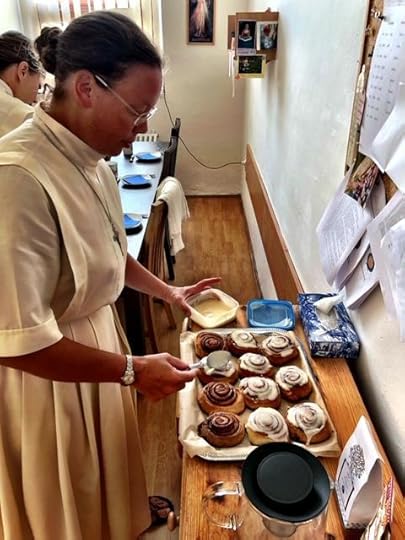
I gave a talk about the Ben Op at a Catholic school, and one at a Catholic seminary (it was open to the public). Jan Banas, the Slovak translator of The Benedict Option, joined me for some Q&A translating duties. And, more importantly, he gave me a jar of his homemade apricot preserves. He had no idea that I dearly love all confiture, but apricot is my favorite:
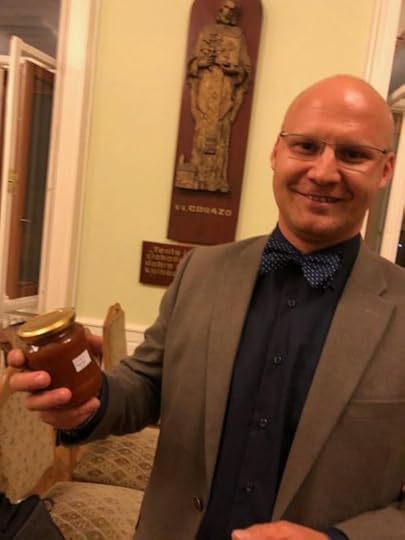
I also was shown around the Nitra cathedral by these three lovely young ladies from the Catholic school:
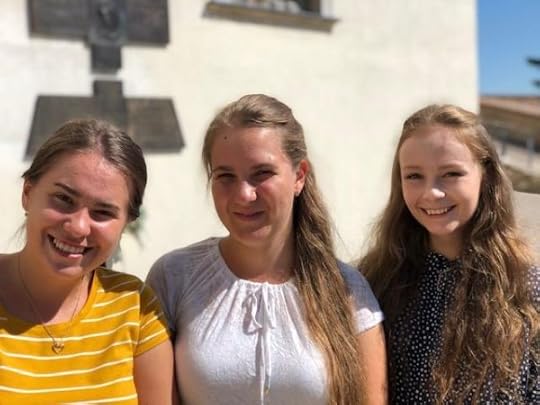
I had lunch with their headmaster, and a couple of priests. Utterly fascinating conversation — all off the record, but let me tell you, these people are completely undeceived about what’s happening in the world, and why it’s happening. I wish there were some foundation with the money and the vision to bring folks like this together to share ideas and make connections.
The sisters sent me off this morning with FIVE JARS of their own apricot preserves! Even sweeter was the experience of attending mass with them this morning in their chapel, and listening to their angelic voices.
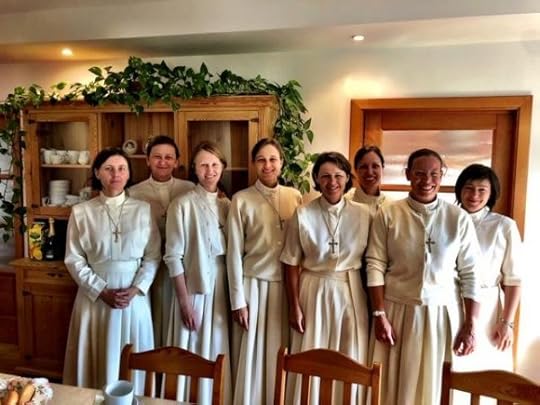
In Bratislava, I met with a group of young Catholics involved in the pro-life movement and other social movements. It was intense. One young woman contributes her time preparing young Catholics for their first communions. She said that it’s pretty discouraging to see that almost none of them want to be there in the slightest, and are only there because their grandmas bribed them by offering them a smartphone if they took the classes. In many cases, their parents never attend mass. Because their parents are not really open to Christianity, it’s all an empty social ritual for the kids.
“It’s really hard to get through to them at all,” she said.
Slovakia is one of the most Christian countries in Europe, but it’s sliding downhill here too.
One person around the table said something I’ve heard a number of times in these former communist countries: that at least under communism, you knew who the enemy was, and you knew that they were lying to you, and trying to manipulate you. Said this person: “Now we are in a time when young people can’t imagine that this ideology could be bad. They can’t see themselves being manipulated.”
Continuing this point, someone — maybe the same person; my notes aren’t clear — said that Czechoslovak society was unable to resist communism when it first appeared, because communism was “young and modern.”
He said:
“We failed. We are doing the same thing today with this new ideology. … Communism was an ideology that was clear. Now [the new ideology] comes from so many streams. When you tell young people that it’s an ideology, they don’t believe it. They can’t see it.”
Another person, a leading Catholic social activist, said that young people in Slovakia today trust not the Pope or traditional authorities to make a better world, but rather Silicon Valley figures like Mark Zuckerberg. He likened the situation today to that of the nihilists of Dostoevsky’s novel Devils. The influencers today are relatively small, but they’re nihilists, and they’re going to lead society to a real conflagration.
The conversation moved to a discussion of what, exactly, this new ideology consists of. We agreed that its very amorphousness is key to why it’s so powerful. One person said, “Nobody wants to live by any set of rules. They don’t want to live by any ideology. They think they are free.”
This person said that people aren’t really free, but they think that by doing what comes natural to them, they’re exercising liberty. One lawyer at the table called the situation “totalitarian.” I asked him why he used that word to describe a situation that was on the surface extremely different from communism.
“If you disagree with them, you are the enemy,” he said. “They enforce what they’re doing.” He meant that the embrace of so-called freedom by progressives today is a self-justifying façade for rigid ideological conformity.
Towards the end, I asked the group where they found hope. The lawyer said:
“There is something in the nature of a human being that makes you do things because they are right and good, even if you can’t expect a results from them. We have experience in Slovakia of people who came through the Second World War who did the right things, even though it was hard, and it didn’t benefit them at all.”
A Catholic activist at the table said:
“We will win. I have faith. Probably not in my lifetime. But despite this, I have to do something.”
At the very end, we had a brief discussion of a point I’ve heard several times in my travels here: total mystification as to why people will talk privately about how they think what progressives are pushing is wrong, but will never, ever take a public stand against it. This is true in the US too, but here in Slovakia, there’s more popular sentiment against the progressive social elites. Still, people remain silent. The power of US and European multinationals over the economic futures of these countries is vast. It’s about Woke Capitalism. One man tonight here told me about a friend who worked in 2015 for a US-based IT firm in Bratislava, and who was unwise enough to say on a company internal message board that he did not favor same-sex marriage (this was a discussion that had arisen on the board). Within one hour, he had been summoned to HR and fired. That story probably explains why ordinary people are afraid to speak out: they fear economic retaliation by elites. Still, the result is social change.
We talked for a few minutes about the rise of the far right. My Slovak interlocutors said that the far right party in this country, the People’s Party, has increasing support because they speak openly against liberal migration policies, abortion, and gender ideology — and don’t care what others think. Some at the table said that the People’s Party takes it too far, but they still gain support because they’re the only ones that many people trust to do what they say they’ll do.
One person at the table said that the People’s Party is the most popular party among high school students, while the harder left parties are the most popular among college students. As in other countries, political extremes are hardening.
Well, after that, it was time for lunch. My pals Juraj and Timo took me to a nearby Italian joint. After lunch, they took me to a nearby monument to Father Tomislav Kolakovic, the heroic Jesuit who came to Slovakia in 1943 to prepare a church underground to resist communism, which he expected to come after the war. My new book project will try in some way to encourage new Kolakovices to rise and prepare us for the new soft totalitarianism fast coming. Carved on the monument are the three words that were Kolakovic’s motto: “See. Judge. Act.” It was taken from Catholic social teaching. The phrase is a method of resistance that says, in effect, to observe what is happening, discern its meaning, and then act on that discernment.
See. Judge. Act. That heroic priest built an underground church movement on those simple words. Seeing is so hard in this time — and that’s the particular challenge of this moment. Timo told me that a contemporary Slovak priest said that the communist era was like darkness, but our own time is like fog. The light of faith pierced the darkness, but when light shines on fog, it can’t pierce it easily. I think that’s profound.
I came back to the hotel to do some work on the speech I’ll be delivering on Friday in Budapest, and then later headed over to Timo’s for dinner. (Remember Timo and his wife Petra from earlier this year?) I got to meet his new son, Baby Elias. Here’s a VFYT from the Krizka family table. That’s Elias sleeping in the Baby Bjorn on Mama Petra’s chest. The wine was homemade, and delicious. The arugula on the risotto was from their own garden:

Bratislava, Slovakia
After dinner, Juraj, Timo and I walked over to a pub and met some more folks from the Hanus Fellowship, a Christian civic organization, for beer and conversation. Here’s a party pic of Martina and her husband Juraj (not Juraj Sust) — Evangelical Christians who have really interesting takes on politics and culture, and who are very up to date on currents in American conservative politics:
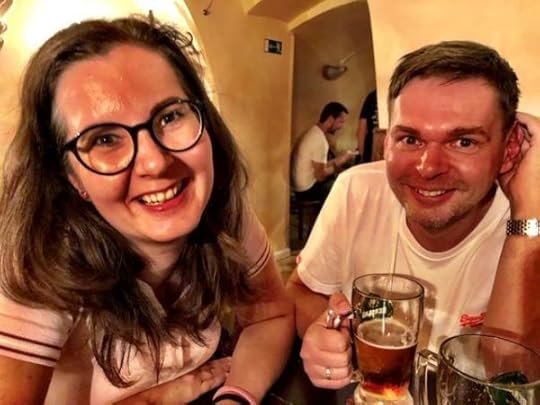
At last I had to head back, because I’m catching an early train to Budapest in the morning. Timo walked me back to my hotel, along with his pal Slavomir (I hope I’ve spelled that right), who, like Timo, is a filmmaker. Slavomir showed me a book of samizdat (underground outlaw publications) that his family found in the personal possessions of his aunt when she died. From the outside it looks like an ordinary notebook, nothing special. inside were hand-printed prayers, Bible verses, and spiritual commentaries. They had to be kept hidden under communism. Slavomir said that the courage and charity of the Open Doors Foundation, an international charity serving persecuted Christians worldwide, made the publication of a lot of Christian samizdat possible. He gave me a copy of God’s Smuggler, the memoir by the Dutchman known as Brother Andrew, who founded Open Doors in 1955.
This samizdat prayerbook is a treasure. This is how Christians and other dissidents once had to live in this country. It could happen again, you know — and it could happen to us too. We are in a culture war with people who despise the church — and who hold the cultural and economic high ground.
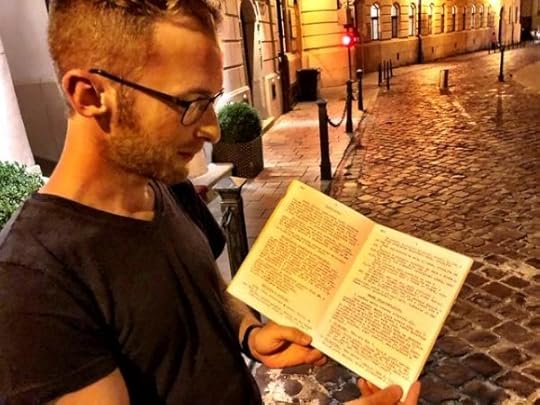
Advertisement
September 3, 2019
The Therapeutic Caliphate
While I was in Lustenau and far eastern Switzerland, I met Giuseppe Gracia, the media spokesman for the Catholic Diocese of Chur. He is very much a fellow traveler of Your Working Boy. One of his Austrian readers told me about his book The Therapeutic Caliphate (only published in German, alas). It sounded so much like the book I’m working on now, about “soft totalitarianism,” that I reached out to him online and asked if we might meet to talk about it. He generously came over to Lustenau, where we talked for over an hour.
It was all off the record (for now), but he did send me a link to this Swiss German newspaper column (in Neue Zürcher Zeitung) that he wrote about his idea. Here it is, via Google Translate:
In Western Europe, we have created a “therapeutic caliphate.” The term comes from the Swiss philosopher Michael Rüegg, meaning a new form of rule: not in the name of a god or a state power, but in the sense of a social therapy. The therapy of an elite, which cuts off the Jewish-Christian roots of the West and wants to liberate us in the course of globalization from the stumbling block of outdated religious or national identities.
Every society needs a good elite that can take a leadership role for the general public through special talents. However, this is an elite that confuses its political mandate with pedagogical-moral authority over voters. Examples would be the style of government in Sweden or Germany, but there are also politicians in Switzerland who act as curative teachers of social cohesion. “The world is changing, but we can do it. We are not afraid of the open borders of our solidarity.” These are typical messages of this policy. “We are not seduced by populists. We fight for a better global climate, against fake news, nationalism and hate crime” These messages are no longer aimed at dealing with reality.
Political correctness is an effective drug. In public debates, it ensures that the contest of ideas must give way to a moralistic beauty contest: the participants in the discourse are divided into good, progressive and dubious, reactionary people. This treatment includes the cleansing of public life; for example we have to embrace “non-violent language” — a language that does not hurt anyone’s feelings, which means that nobody says anything authentic anymore, because someone can always feel hurt. The opposite does not appear like a mature, resilient person, but like an emotional treadmill.
This fits in with the so-called “Safe Space”. This is a spiritual shelter built for students, in which all may remain in their ideological harmony. The potentially discriminating filth of uncontrolled voices of opinion will disappear. By the way, also from classics of literature, such as the word “Negro” from “Uncle Tom’s Cabin” and “Huckleberry Finn”. It is a purge that can meet the ancient Roman poet Ovid as well as the Berlin contemporary poet Eugen Gomringer , who dared to compare the beauty of women in a poem with flowers. In addition, “Snow White” should no longer be kissed awake by a man, because that cemented false gender roles.
This is how we experience an intellectual infantilization of public space. Instead of maturity for conflict, hypersensitivity and sentimental dogmatism dominate. Instead of freedom of expression Duckmäusertum. The medial, therapy-sensitive filtering of numbers and studies is especially true for topics such as migration and Islam. For example, in Sweden, the comparative figures or statistics that could disturb or “divide” the people are not even published, such as figures on migrants’ rape or other crimes. Or dealing in Germany with the Cologne New Year’s Eve of 2015, when about 800 women by men from Africa and the Middle East were harassed, robbed and abused.
It is interesting that Alexis de Tocqueville foresaw such a policy as early as the beginning of the nineteenth century, in the book “Democracy In America”: “There is a considerable guardianship of the citizens, which is responsible for ensuring the well-being of all citizens and watch over their prosperity. This guardianship is absolutely, in detail, punctual, forward-looking and mild. ”
Here the danger of a pedagogization and therapeuticization of the society for democracy becomes clear. It lies in an ultimately discouraged or even depressive thinking that no longer expects man’s maturity. We risk forgetting that the design of living together, the freedom of thinking and speaking, is not a leading task of the elite, but that no one may take this away from another. We forget that the dignity of the individual always means the right to be taken for full, uninformed, uninterested or stupid as a person may be. Stupidity is not a license for state paternalism – and freedom is not the prerogative of the clever.
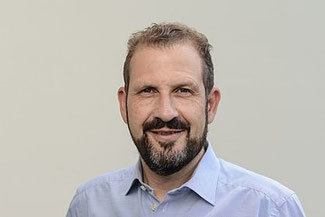
Giuseppe Gracia
Advertisement
September 2, 2019
The Krönele Synod
Last night in Lustenau, I gave a long speech about the Benedict Option, assisted by Tobias Klein (above, in the red t-shirt), the translator of the German edition. It was a wonderful time; it is hard to overstate how good it is to make new friends. I was startled and delighted to learn that a group of Swiss Reformed pastors drove in from the Zurich area to hear me speak: the eminent theologian Paul Bernhard Rothen (former pastor of the Basel cathedral), Mike Lotz, and Lukas Zünd, who was ordained just two weeks ago. After the talk, we retired to the Gasthof Krönele for an ecumenical synod of sorts: the Swiss Reformed, the Roman Catholic (Tobias), and the Eastern Orthodox (self). Ingrid Schmalleger, who was also present (and who took this photo), is a Free Church Evangelical who lives in Lustenau.
The conversation was all off the record, but let’s just say that we had a great exchange about the profound challenges all traditional Christians face in living out the faith in this post-Christian world (especially when some of the fiercest post-Christians are in the church!). It was such a delight to meet Protestant Christians at a European Ben Op talk. I can only think of one previous time when it happened. Usually my European hosts and audiences are Catholics, but meeting these new Reformed friends was a good reminder that the Ben Op is an ecumenical project.
Our conversation was also a reminder that in the US, most Christians really have no idea how bad things can get, in terms of believers falling away and/or apostatizing while staying in place. As usual, it’s much easier to talk about the Ben Op with European Christians; they don’t need convincing about the fact of massive decline. They only want to know what can they do about it.
When I bade my new Swiss friends goodnight, I told them that I hope to come to Switzerland sometime in the future to talk about what the Ben Op would look like from a Swiss Reformed point of view. I need to take my Reformed buddy Lance Kinzer, who is a big part of the book, along with me, to share some ideas, and to learn from our Swiss brothers.
I’m headed to my beloved Slovakia today, and will speak in the church in Nitra on Wednesday night, then in Bratislava on Thursday. Off to Budapest on Friday.
I like this photo of the Reformed pastors. Good men fighting the good fight for God:

Lukas Zünd, Bernhard Rothen, Mike Lotz
UPDATE: A German Evangelical reader writes to say that it is not the case that all European Christians are aware of the cultural and religious decline around them:
We went to a Christian family retreat for summer vacation. We were 10 families from all over Germany from all types of evangelical denominations (plus one Catholic). It was altogether a very refreshing time. However, on a side note, not one person I talked to, shared in any way/shape/form our urgent concern as far as the cultural decline and the church is concerned. This is hardly statistically representative, I know. But still. It reflects my experience on my little spot on our earth.
I appreciate the prompt to clarify. It is true that not all Christians see it this way. In fact, someone who came to my Austria lecture told me that only a minority of Christians there grasp the seriousness of the crisis. The typical response one gets from Christians in denial is that to express concern is “apocalypticism,” and to call for greater spiritual and moral discipline in accordance with Christian normative teaching is “fundamentalism.”
So, I should be more careful with my language describing the situation in Europe. In my experience, it is much easier to talk to European Christians than to Americans about the Ben Op, because the evidence of Christianity’s decline is everywhere. But it is still possible to live in denial, and many do.
Advertisement
September 1, 2019
Postcard From Austria & Switzerland
Hello from Lustenau, an Austrian town on the Rhine river, in Voralberg. I’m here to speak on September 2 at a week-long lecture series at the Erlöserpfarre, a Catholic parish. Also here this week is the young man in the photo above, Kevin Becker. He has an amazing story to tell.
In August 2011, Kevin fell from the second story of a house he shared with other guys. An athletic young man, Kevin fractured his skull, and injured every lobe in his brain. He was in a coma near death. Doctors didn’t think he would live, and if he did, he would be severely and permanently brain-injured.
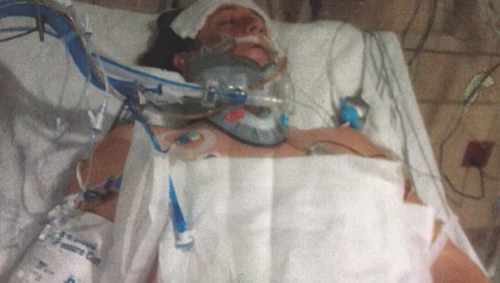
He was in the coma for nine days. During this time, he dreamed that he was living alone in his old house with a new roommate named Giorgio; all the other roommates were gone. Giorgio wouldn’t let him leave the house, telling him simply to be patient, that he wasn’t ready to go out yet. After Kevin emerged from his coma, he told his parents about the “angel” who had been with him in his coma dreams.
Finally Kevin’s mother showed him an image of the Blessed Pier Giorgio Frassati, a 20th century Italian who died in 1925. Frassati was an avid mountaineer and devout Catholic living in Turin. Though he was from a well-to-do family, Frassati was passionately devoted to the poor of his city, and immersed himself in work for them through the St. Vincent de Paul Society. He also advocated for social reform. When he died from a sudden onset of polio at the age of 24 — it is believed he caught the disease visiting the slums of Turin — Frassati’s parents were shocked to see throngs of Turin’s poor turning out on the street to tell him goodbye. They were rich people who had had no idea that their son was spending so much time and money on helping the poor of their city.
When Frassati’s coffin was opened in 1981, his remains were found to be incorrupt. Pope John Paul II beatified him in 1990, following the verification of a miraculous healing attributed to his intercession. If the Vatican can confirm a second miraculous healing attributed to Frassati’s intercession in heaven, he will be canonized as a saint.
Which brings us to Kevin. When his mother showed him the image of Pier Giorgio Frassati — a man Kevin had never heard of — Kevin said that was his angel, the man in his dream.
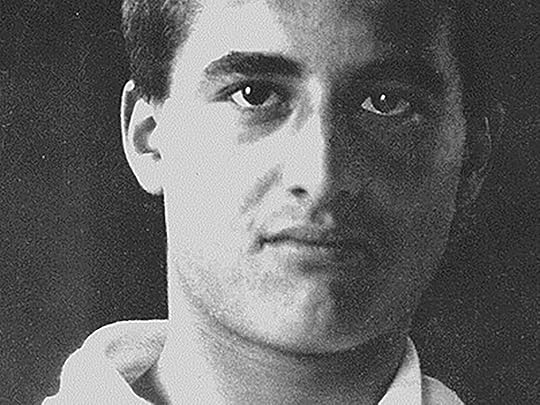
Pier Giorgio Frassati (1901-1925)
Bl. Pier Giorgio Frassati is not well known in the US. A family member had sent the prayer card image to Kevin’s family in the hospital, urging them to ask Blessed Pier Giorgio to pray for Kevin’s healing. The day after they placed the image at Kevin’s bedside, he awoke from his coma. A few days later, the college kid who wasn’t supposed to live, and if he lived, was supposed to be severely and permanently disabled, walked out of the hospital under his own power, and stood in the hospital parking lot tossing a football with his brother. Later, doctors were stunned by how rapid and complete his recovery was. Medical science can’t explain it.
Seriously, this happened. You can see it all in this video made to tell Kevin’s story:
Kevin travels from time to time to tell the story. That’s what he’s doing in Lustenau this week. He’s a really nice, ordinary American guy … who just happens to have been visited by a saint while he was in a coma, and miraculously healed.
Alert readers of The Benedict Option will remember that Bl. Pier Giorgio was the inspiration for Marco Sermarini and the Tipi Loschi of San Benedetto del Tronto. It was Pier Giorgio who first coined the jokey term “tipi loschi” (“the usual suspects”) to describe the small society of fellow young Catholics — men and women both — he founded. He wanted them to be united in prayer and a spiritual support to each other throughout their lives.
The leader of this annual parish conference on spirituality and ideas is Father Thomas Sauter, the parish’s pastor. He invited me to come present on the Benedict Option. My daughter Nora, who loves to bake, sent Father Thomas a tin of her chocolate chip cookies, along with the recipe. Here we are with the cookies shortly after I arrived last night:
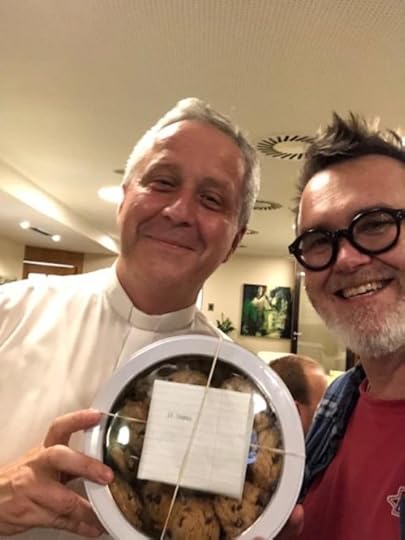
Last night, after Father Thomas went home, I talked with some of the young adult Catholics who had been having dinner with him when I arrived at the gasthaus. Today, after the midday mass, I met others in the parish hall, at a luncheon. Over and over I heard the same thing: Without Father Thomas and this parish, I don’t know what we would do.
People told me that the faith is in grave trouble in this region, and that so many of the priests are quite liberal. They preside over dying parishes. But Father Thomas, they said to me, is a man who really lives his faith in a dynamic, orthodox way. Young people described him to me as a real spiritual father to them. I haven’t had a chance to talk to him much — his English is spotty, and my German is non-existent — but he is a jolly man with a warm presence. One young woman told me that Father Thomas’s parish is like an oasis in the Rhine River valley.
Two of Father Thomas’s young parishioners are Gabi Stadelmann and her boyfriend Philip, whose last name I can’t remember. Gabi is Swiss, and comes from the village of Tübach, just across the border. She told me that she grew up on a small farm next to the Kloster St. Scholastika, a Capuchin women’s monastery that closed this past spring after 400 years. The Stadelmanns are a big Catholic farm family. At least two of their six adult children — Gabi’s brothers — still work on the farm. They have dairy cows, and grow apples on the hillsides overlooking Lake Constance.
When Gabi told me about her family last night, I asked if I could go meet them. This afternoon, Philip drove me across the Rhine to do so; Gabi joined us shortly. Here we are enjoying some late summer sun at the farm. From left to right, Niklaus, Rita, Oma (Rita’s mom), Gabi, and Philip.
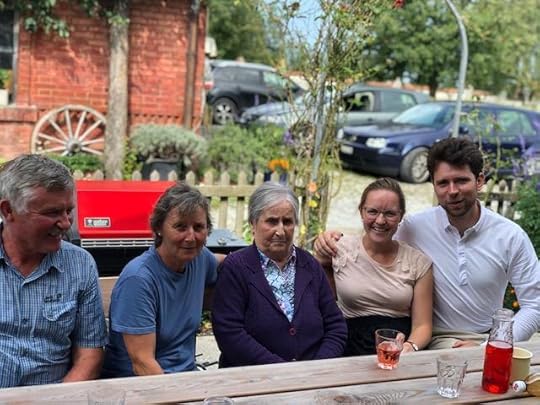
The Stadelmanns were so kind and hospitable. We drank seltzer with some sweet syrup they made from herbs grown on their farm. They talked about how much they love Father Thomas, but how lonely it is to be a practicing Christian in their part of the world these days. So many people are losing their faith entirely, and the institutional church is going ultra-progressive. Said Niklaus, “It feels like the fall of the Roman Empire.”
Hey, I said, do I have a book for you to read! I told them about The Benedict Option, and invited them to hear my lecture on Monday night. I tried to offer them some hope by showing them photos of the Benda family in Prague, and telling stories about how Czech dissidents would gather at their apartment for encouragement as the dissidents were going and returning from police interrogation. Whether or not these victims of communism were Christians, they knew that the Bendas were faithful Catholics, and would receive them with compassion — and offer them strength.
Maybe that’s what God will call you to do in this present and coming darkness, I suggested to the Stadelmanns.
Gabi and Philip walked me next door to the St. Scholastika cloister, to see the beautiful chapel. She told me that she and her siblings had grown up worshiping there, and playing in it. In March, the few remaining nuns left after four centuries of a continuous women’s monastic presence on the hillside. That cloister had women religious living in it over a century before America was founded. Now it is empty. Heartbreaking hardly begins to describe it.
But there, across the Rhine, is Father Thomas and the Erlöser parish. I began to see why the faithful treasure him.
I took some photos of the Stadelmann farm, including their beautiful wooden barns and cattle, but I didn’t realize until I got back to the gasthaus in Austria that something had gone wrong with my camera. Most of the photos were blurry. But here are a couple that survived:

Stadelmann family farm
And this one of a house for wild bees:

Honeybees don’t live in houses like that. The Stadelmanns do keep honeybees, though, and sent me away with a jar of their very own family honey:

If only they knew how much a foodie like me cherishes gifts like this! Danke schön, Stadelmanns!
Back in Lustenau, I went to the parish to hear a talk about Frassati given by Christine Wohar, the founder of FrassatiUSA. Then they had Eucharistic adoration, and mass. I wanted to stay to hear Kevin give his testimony, but my back pain started acting up — it has been a tough past couple of weeks on that front — so I walked back to the gasthaus to get meds and lie down flat. Just before I left, I took this shot of Kevin standing at the back of the church during mass:
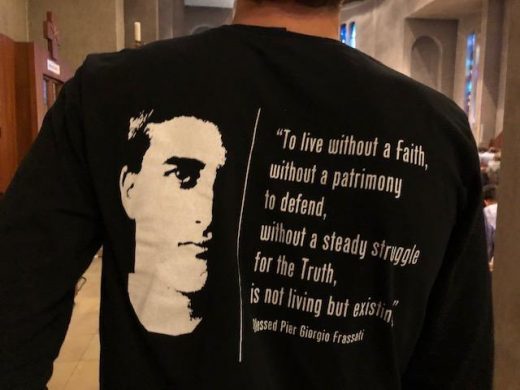
That quote from Blessed Pier Giorgio Frassati are words to live by:
“To live without a faith, without a patrimony to defend, without a steady struggle for the Truth, is not living but existing.”
The people I am meeting in this little parish on the Rhine, and on the hillside overlooking Lake Constance, are what’s left of a civilization — Christendom — that is dying and nearly dead. But they are trying to find a way not merely to exist, but to defend their patrimony, to struggle steadily for the Truth, and to live. They could use you Christians standing with them in union of prayers. For me, simply to be with them and to hear their stories gives me strength. And to know from Kevin and his near-death encounter with a saint reminds me that miracles really do happen.
If you are a Christian reader — Catholic, Protestant, or Orthodox — in the region around Lustenau, why not come out on the evening of September 2 and hear me talk at the Erlöser parish? Details are here. Lecture begins at 7:15, with Q&A to follow. If you are reading this blog, you probably already know the Benedict Option idea. But this would be a great chance to meet more Benedict Option people. We need to know each other, and form networks and bonds.
Advertisement
Gays And Orthodoxy, Again
I arrived in Austria close to midnight last night, logged on, and found this extraordinary letter from a reader, written in response to this article of mine about Orthodoxy and homosexuality. Actually, I had seen an earlier version of it last week. I asked him if he would rewrite it to obscure some details to protect his own identity, so I could publish it on this blog. He has done so. I will have a little commentary afterward. The letter begins:
I’m an American Orthodox living in a traditionally Orthodox country for a number of years now, and recently in the Orthodox internet world there have been a lot of comments about Orthodoxy and homophobia and homosexuality, in particular spurred by the recent conference in England in which several well-known Orthodox figures took part. Many Orthodox in America seem shocked at the conference, and in particular at a talk given by Nik Jovčić-Sas about homophobia and violence in traditionally Orthodox countries. The response I have seen to that is greatly saddening, as most people seem more interested in attacking the presenter and his motives than in examining what he has to say.
Living in an Orthodox country, I can affirm that everything he says is true, and worse even! And then it occurred to me, that the extent of homophobia and violence against gays in most traditionally Orthodox countries is something American Orthodox are probably totally unaware of. It’s pretty awful, how much open hatred towards gays and inciting violence towards them is perfectly acceptable, and all this to an extent that I think most Americans in 2019 have trouble picturing it as a reality, and thus they dismiss such accounts as being basically propaganda or isolated incidents being promoted by people who want to change Church teaching.
I, however, don’t aim to change the church’s teachings on homosexuality, and as an American Orthodox living in an Orthodox country and actually working for a Church organization, perhaps what I have to say will be listened to, because the story needs to be heard, regardless of who is telling it.
First of all, it’s important to realize that the “moderate” views common in Orthodox parishes in America and the West about homosexuality — that homosexual behavior is a sin but that such people should be embraced in the Church and helped to live lives of celibacy, and also simply that it is an issue that can be talked about at all without people breaking out into hysteria — is almost unheard of in Orthodox countries. It’s also important to remember that not only is Orthodoxy a small minority religion in America, but also American Orthodox are a small minority within world Orthodoxy, and the life of the Church in America can differ significantly from what MOST Orthodox around the world experience, including on this issue of homosexuality/homophobia.
Thus, in a typical Orthodox country, what you are basically looking at is a large number of people who use the word “fags” to talk about gays and openly talk about how they should be killed, with a pretty small number of people who take the other extreme and just say homosexuality is totally acceptable morally. The latter are a small minority and have no voice in the public sphere or mainstream discourse. Zero. There are very, very few people who would hold that homosexuality is a sinful behavior, but who would not then have a very high level of prejudice and overt hatred towards those who struggle with it. There are very few people who would be okay with going to church with someone who is celibate but inclined towards homosexuality. It is indeed very dangerous to speak about being gay in an Orthodox country. You could be killed or beaten, in a worst case scenario, but even if that doesn’t happen, you almost certainly would be screamed at, have insults hurled at you, and be cast out of your group of friends and family, lose your job, etc. It is not something one can talk about really at all.
Thus, homophobia, hate, and violence are what most Orthodox Christians worldwide who struggle with same sex attractions would be facing, it’s thus absolutely essential to include those experiences in any discussion of Orthodoxy and homosexuality.
I say that because I watched Nik Jovčić-Sas’s talk on youtube, and while yes, he does have an agenda to normalize homosexuality, at the same time, in his talk he really did just try to make people aware of the very real violence against gays in Orthodox societies, and the Church’s lack of response to that. Furthermore, he is open about his “agenda,” and for that I quite respect him. And yet all over the internet, including in your article, I don’t see much response to what he actually said, to addressing the issue of violence and hatred. I see a lot of turning back to the debate of whether or not homosexuality can or should be morally accepted, who is trying to force who to do what, and so on. And that makes me sad, and in a way, proves right those who would say that upholding traditional morals is inherently homophobic, because it seems like people who say homosexuality is a sin do, in fact, hate, or at least, don’t care about, gay people. It is a very real discussion that needs to be had. I would really like to see an article from you or another mainstream American Orthodox on just that, on the reality of violence against gays and homophobia in Orthodox lands.
What really struck me in your article was the line, “Orthodox clergy and laity must hold the line on moral and theological truth, but if they can’t condemn cruelty against gays, who are made in the image of God like every other human being, then they have no moral authority.”
This is precisely the problem for so many gays in the Church, especially in Orthodox lands. The Church really has lost its moral authority for so many people for so many reasons, and what do we do about that? Please let me explain with some of my own personal experiences:
There are a few bishops in the local Church of the country I live in, for example, that speak very hatefully about gays very publicly, it is sometimes even considered over the top by local standards! I have heard bishops here actually say in public that gays are committing a sin worse than murder, blame the collapse of the economy and the nation after the fall of communism in the 1990s and all of the troubles that ensued (a very painful issue for everyone) on the supposed presence of gays in the country and that the collapse was God’s punishment for allowing “those people” in our country, and call for all gays to either be exterminated or driven out of the country. It sometimes, to me, as an outsider, sounds like a parody of itself, almost “What gay activists would like the Church to be saying so they can prove the Church is homophobic”, and yet, it isn’t a parody, and it’s all very real.
Additionally, it’s important to mention the fact that it’s really not uncommon when priests or church figures speak about homosexuality, they refer to gays interchangeably as “fags.” So, if that isn’t openly preaching homophobia and hate, then I really don’t know what is. To be sure, this isn’t what you would hear in an average Sunday in an Orthodox parish here, mostly you won’t hear anything about homosexuality at all, but when you do, it’s invariably the kind of thing I just mentioned.
And so then when certain prominent hierarchs in the Church take such a virulent homophobic stance, I don’t see how the Church can claim to distance itself from anti-gay violence in any credible sense. They are not just silent about violence against gays, they are pretty openly inciting it in some pretty prominent cases! What else are we to understand it to mean when we are told sodomy is worse than murder, and all of the woes of our country are caused by God cursing us because those fags are here, and we need to get rid of them? How is that not a call for violence against gays?
It also daily comes as a shock to me, as an American in an Orthodox country, how much people do feel the need to talk about gays and how awful they are. It’s almost like you would think there is a gay pride parade marching down their street every single day, but that’s far from the case, of course. There are very few, if any, pro-gay voices that are heard in the public sphere here; it just doesn’t really exist. And yet, everyone feels the need to talk about how gays are awful, the worst sinners ever, why being gay is worse than killing someone, worse than being a pedophile (or conflating pedophilia and homosexuality), how even demons are disgusted with homosexuality, how God does not hear the prayers of gays, how committing homosexual acts makes God incapable of “looking upon a nation,” etc.
And you will hear this just…every day…in casual conversation.
It was also the first time in my life that I heard anyone openly say “I hate gays.” And so that was just…a huge shock. Or another time, I think my third or fourth week here after arriving, I saw a huge mural on a wall and it said in the local language “We will exterminate the gays”. I asked my (local) friend about it, and he very quietly said, “Oh, some people get confused and think we should kill the gays because the Church is against it,” and then he went on to add, “But we should stop talking about this now, or someone could get confused and think we are one of them and hurt us.” It was unreal. And yet, seeing graffiti/murals like that is actually pretty common.
There is also how homosexuality is dealt with in the Church with priests and monks and others who work for the Church. You just don’t talk about it. Ever. In confession, yes, but even then it’s sort of, whispered and short and still not really discussed, and mostly my sense in talking about it with others is that the confessor will refer to it all in euphemisms and not actually address it and just move the conversation along to something else as quickly as possible.
This is where what you said about your homosexual friend confiding in you for support in living a chaste life (combined with some comments further down on the page) got me thinking, in light of my experiences as an Orthodox Christian in America and then here, in an Orthodox land. In America, within the church community, we could talk about those struggles with church friends, it was okay, and I think that was a good thing.
I never felt in any church community I was involved in in America that anyone was coming on to me. We were on the one hand more open about those struggles as friends in Christ, which people here would find scandalous, but on the other hand, I can’t say that in my case anything “bad” ever happened in the context of the Church in America with regard to homosexuality. The honesty about such tendencies created a safer environment, I think. It’s when we repress things and pretend they don’t exist that they become problems.
It’s the same with how society as a whole has dealt with homosexuality: In America if you want to be gay, you can just go out and do that, you won’t lose your job or be physically attacked, and in 2019, you probably won’t lose any friends or family members. Society gives you that freedom. In most Orthodox countries, that isn’t the case at all, and yet, gay people still exist, but how? Many hide in monasteries, or as priests in parishes, they find a “cover.”.
I think partly that is why I’ve encountered the situations I have within monasteries and in my work in the Church here, which I didn’t ever feel was even a remote possibility in America. In America, it is more clear who is who, in that regard.
Thus, in the Church here, no one talks about homosexuality, and yet, I would say such acts are far more present, sadly. I’ve had priests come on to me quite a few times, once I had to actually physically kick an archimandrite [abbot] to get him to stop making advances at me when we were on a church business trip together. In another case, I was outright sexually assaulted by a hieromonk [priest-monk] in a monastery that I was visiting for reasons related to my work. It’s so taboo and something that you just so cannot speak of, that all that provides a cover and a “safe place” for a lot of bad things to happen. You can do whatever, because everyone is too ashamed of what you are doing to even deal with it, as that would require talking about it.
It’s all totally counterintuitive. And in fact, the monastery where I was sexually assaulted by a hieromonk was actually the residence of one of the bishops I mentioned earlier on who is so over-the-top homophobic in public. And then at home, he protects monks and priests who are sexually active, and when I say protecting, I mean, he will squash people who find out about what is going on. He knows full well what they do, and instead of stopping the sexual activity from going on, he stops people from talking about it by threatening them and slandering them.
This is what happened to me several years ago when, after the assault, I went to tell the abbot what happened (the bishop not being present at the time). What followed was an all night interrogation of ME as if I were a criminal. This was early on in my time in “the old Country,” and so I wasn’t aware of how homophobic people were or how such a thing would be dealt with. Thus, among their many questions was asking if, otherwise, I had ever been attracted to men. I stupidly believed that I could be honest to priests and that they would help and not hurt. Nothing could be further from the truth in this case.
Based on that, they decided nothing bad could have happened, as it would mean I must have wanted the hieromonk to do that, and the abbot also said to me “We know perfectly well what Fr X does, this is far from the first time he does this, and it’s none of your business!” I would have thought that by him doing what he did to me it became my business!
In any case, I should also note that this abbot is now actually a bishop, that the bishop of that diocese at the time then quickly caused me to lose my job and also lose my residence permit for the country for several months (in addition to the homophobia, most Orthodox countries are also quite corrupt). I did encounter him not long after and he pulled me aside to scream at me that I am worse than a murderer, that God cannot hear my prayers, and that I had defiled a holy place. The hieromonk who sexually assaulted me served liturgy the following day as though nothing had happened, and is still there as far as I know.
The Church’s overwhelming silence would seem to serve both people who would like to change the Church’s teachings, and those who are truly full of hate and prejudice. They both interpret the same silence as they would like.
You also commented on the statement “In my opinion, our hierarchs have been making matters worse by their silence, as they merely succeed in giving everyone the impression that the Church has nothing to say in its own defense.” I would like to invite you to consider that statement in context of what you say later on, “And I’m betting there are people who would genuinely be open to the church’s teaching, if they ever heard it proclaimed.” That is precisely it, I think.
What you speak of as being the Church’s teaching, of the fact that homosexual acts are sinful, but that we should not hate gay people…I agree with you that it is Church teaching in the sense that that is what one would find in the Fathers and in true Orthodox Christian believers…but it isn’t so true in a functional sense. Living in an Orthodox country, it is rare to encounter viewpoints like yours or mine. It’s pretty much always either: overt homophobia and hatred (most common if the topic actually is raised), complete and utter silence (most common from Church figures), or just an open acceptance of homosexual behavior (least common, and I’ve never heard it openly stated by any church figure here). I think the closest I have come to to encountering a compassionate upholding of traditional Orthodox moral teaching here are priests who will hear about a homosexual’s struggle in confession, affirm that it is wrong but that it is a struggle they must engage in, and then sort of just…“Ok I heard that, I told you what to do, I accept you, but let’s never speak of this again ever.” And that’s about as close as it gets to finding “support.”
All that to say: In practice, in real, lived Church life, these are truly fair questions: What does the Church have to say to gays? How does the Church help gays in their lives in Christ? How does it help people to struggle against their passions? How does it bring the message of the Gospel and hope to those lost in sin? And the lived reality is more often than not…pretty awful.
It is something the Church is not handling well at all, and I have seen so much done TO homosexuals in the name of Orthodoxy that, I feel we need to talk about that side of things more in the Church, and especially in decidedly “traditional” circles. If you don’t want people denying Church teaching, if you don’t want people using the violence and abuse as an excuse to abandon Church teaching, then we need to see traditional voices speaking out against violence, against hate, and doing so much more forcefully. The Orthodox Church has a lot of housecleaning to do, I thik. The issue with homosexuality is a symptom of a bigger problem in both the laity and the hierarchy.
This may all come as a shock to Orthodox in the West, but the reality is that these kinds of things ARE the reality for most Orthodox Christians in the world. Being called vulgar names, being assaulted, fearing for one’s life, fearing for one’s job, fearing that your friends would not be your friends if “they knew”, and so we must ask ourselves: How is that Orthodox? And if it isn’t Orthodox, and yet that is the overwhelming experience in Orthodox societies, then why doesn’t the Church do more to correct it? Why doesn’t the Church speak out? Why doesn’t the Church do more to spread its actual teachings amongst the faithful?
I don’t have answers to these questions, but at least starting a discussion is a place to start.
I really can’t think the reader enough for this letter. All of this comes as a real shock to me, as an American Orthodox Christian. When readers of this blog ask me why I don’t blog more often on life in the Orthodox Church, I explain to them that American Orthodoxy is tiny, and it is difficult to get news from the rest of the Orthodox world. This is a good example of what I’m talking about. Again, I’m grateful to this American reader who is Orthodox, and who is living and working in that world, for reaching out to me.
You all know where I stand on issues of Christianity and sexuality, both homo- and hetero-. I fully affirm the teaching of Scripture and tradition, without any ifs, ands, or buts. In many American churches — Orthodox and otherwise — the greater pastoral problem is that pastors, lay leaders, and parents are too afraid to proclaim, explain, and defend that teaching at all! And so, they leave people — especially young people — to be catechized by the culture.
This reader tells us that the reality is very, very different in Orthodox countries, such as the one where he lives and works (and I should tell you that I know the reader’s identity, and where he is living; I am not sharing it to protect him). I am a bit ashamed that I didn’t know about this terrible reality for gays and lesbians, and I am scandalized that this is how the Church deals with the issue there. I shouldn’t say “the issue”; I should say these flesh and blood people, who are beloved children of God.
To be clear, I am grateful that the Orthodox Church in those countries defends Church teaching, especially in the face of attacks coming from the West. That is better than the silence of Church leaders, Orthodox and otherwise, in the West. I want to make sure I am heard about that.
However, my God, what a cruel burden these churchmen, and lay Orthodox Christians, lay up on the backs of gay and lesbian Orthodox in those countries! It is hard enough to face going through life without sexual intimacy, as all unmarried Christians must (and gays cannot marry in the eyes of the Church). The Church — meaning the institution, and the assembly of believers — should help those men and women carry that weight, and invite them to help everyone else carry the weight of their own crosses. When I think about the gay Christian friends I have — Orthodox and not — who are committed to a life of faithful chastity, and I consider how they would be treated in certain Orthodox countries, it infuriates me. To be clear, when I think that the Church is responsible for treating any gay person, chaste or not, like this — well, it is a scandal. It really is.
If it takes a scandalous gay Orthodox Christian like Nik Jovcic-Sas to tell the Orthodox world this scandalous truth, and to encourage Christians like the author of this letter to tell this horrible truth, well, God bless Nik Jovcic-Sas (and may God lead him to repentance).
May God lead the Orthodox Church to repentance. I hope to see the Orthodox clerics and lay leaders who deny the truth of Scripture and tradition on the question of homosexuality turn from their errors. I hope to see the Orthodox clerics and lay leaders who are sunk in cowardly silence on the question turn from their errors. But I also fervently hope and pray that the Orthodox leaders who preach violence and contempt for gays and lesbians, and who offer these struggling souls stones hurled at their heads, not the bread of life, will repent before God for the evil that they do. If gay and lesbian Orthodox Christians cannot hear a word of mercy and love from the Church, and a defense of their dignity as human beings, even as the Church calls them to lives of purity and integrity, then of what use is the Church? Especially those hypocritical gay bishops, archimandrites, and hieromonks hiding behind the façade of the cassock. As Jesus said to his Apostles of the towns that would not receive them, “Truly, I tell you, it will be more bearable for Sodom and Gomorrah on the day of judgment.”
In other correspondence, the writer of this letter said that the intense hatred of gays in the country where he lives now explains why so many gay men go to the monasteries to hide. Having grown up in an America that had changed greatly on the subject of homosexuality, the reader never saw gay men hiding in monasteries (or in the Catholic priesthood). He told me that it has been a real education for him about what the closet does to people, and to the Church. Though the reader does believe that the Orthodox Church teaches truth about homosexuality, he also is grateful that it is possible to be openly gay in America and not have to fear for your life and your safety.
I do too. I have always said that we are fortunate to be done with the closet. We can see from the hideous experience of the Catholic Church of our time what happens when gay men hide out in religious orders or the priesthood (the latter being less of a problem and a possibility in Orthodoxy; married clergy is the norm there). What this reader above tells about what he has seen among bishops, priests, and monks in his country was common in the US Catholic Church — and for the same reason. The began by hiding in the clerical life, behind the public assumption that clerics are chaste, and ended by hiding their aberrant and abusive sexual behavior.
Somehow, the Orthodox Church has to learn to walk a courageous and countercultural narrow path, neither demonizing gays and lesbians nor valorizing them as powerful voices in the Protestant and Catholic churches are doing. We are fortunate not to have any Orthodox clerics in America who excoriate gays and lesbians as some in other Orthodox countries do, per this reader’s letter; at least I don’t know of any who do. But we definitely do not need any Orthodox versions of the Jesuit James Martin, who advocates for total acceptance of LGBTs. Nor do we need what we have now, which is a hierarchy in which bishops seem to think that if they’ve all put their names to carefully worded official statements of policy reaffirming Orthodox teaching, they’ve done all that can be expected of them to offer pastoral guidance to the American church.
A truly Orthodox response would infuriate both those who despise gays and lesbians, and those who despise what Scripture says about homosexuality. But what else is there for us to do? We who are orthodox in our Orthodoxy cannot expect gays and lesbians, and their straight allies, to take us seriously if all we show to them is hatred. That is the lesson from this reader’s letter, it seems to me. Nobody will listen to us if we can’t honestly demonstrate that we love them, and bear them no hatred.
But we also can’t expect faithful Orthodox Christians of all kinds to take the Church’s teachings seriously if our bishops and priests and lay leaders won’t talk about them, won’t explain them, won’t defend them, and demonstrate by their silence in the face of these strident attacks by the post-Christian culture (even within the Church!) that these teachings are not important.
Advertisement
August 30, 2019
Italy In Decline
You guys know how much I love Italy and Italians, so you can imagine how painful it was to read this. Gerard Baker of the Wall Street Journal writes from his summer in Tuscany about Italy as the site of a civilizational tragedy. It’s behind the paywall, but I can quote some of it to you (I was able to read it all accessing it through Twitter.) Last week’s collapse of the Italian government prompted some extremely melancholy thoughts from Baker. But first, he expresses his love of and admiration for Italy:
You can make a solid case that the small swath of hilly terrain between Florence and Rome has had more impact on our civilization than any other territory anywhere on Earth.
He’s talking about Roman law and literature, the Latin language, the Italian Renaissance, and Catholicism. More:
But what of it all now? The condition of modern Italy evinces the biblical lamentation for another lost civilization: Quomodo sedet sola civitas. How lonely the city stands.
You can see here a metaphor for the contemporary condition of the West. In Rome this week, they have just about finished putting together Italy’s 62nd (I think) government in 75 years. … Italy has had no real economic growth for almost 20 years. Its accumulated public debt is almost 1 1/2 times the value of its GDP. Just about all the ambitious Italians I meet want their children to be educated in the US or UK.
The country was among the first in the West to enter a demographic death spiral. The Italian birthrate is below replacement. The single-child family is almost standard, so millions of Italians have no siblings, aunts, uncles, cousins. The extended family, that natural community of love and support, is going extinct.
The traditional centerpieces of life — family, workplace, community — have been eroded to the bone. Religious observance has collapsed. In the beautiful Tuscan churches I visited, there were probably more priceless works of Renaissance art than there were worshipers. A Caravaggio for every communicant.
Baker says that Matteo Salvini, who brought the government down last week, and who now appears to have been outfoxed, won’t likely stay out of government for long. That’s because his arguments for stronger borders, lower taxes, and less government appeal to people in this “decaying economic and social landscape.” More:
We tend to look at modern Italy and see an outlier, an extraordinary place whose past will far outlive its future. But maybe we should see it not as an exception but as a kind of pioneer of Western decline.
Meanwhile, journalist Mattia Ferraresi has a really good piece in Foreign Policy magazine, on what he calls “Italy’s Great Schism” — the conflict between Pope Francis and Matteo Salvini. He begins by referring to a sharp political exchange in Parliament among leading politicians, all of whom appealed to the Gospel:
The display of religious rhetoric in a political setting was unusual even for Italy, a country deeply shaped by the Roman Catholic faith that in the postwar era was ruled for almost five decades by Christian Democracy, a big-tent party that included different Catholic sensibilities and was closely entwined with the Vatican hierarchy. Salvini’s quasi-papal attitude in the name of an ethnonationalist interpretation of the faith, in stark contrast with Pope Francis’s vision, has been under scrutiny for months, but the government crisis prompted a full-on holy war.
It is a tale of two Catholic churches. One is focused on social justice, welcoming migrants, helping the poor, protecting the environment, defending the virtues of the European Union, and building bridges rather than walls.
It proudly sports a cosmopolitan identity and talks about diversity and inclusion. It firmly opposes leaders like Salvini and U.S. President Donald Trump, whose ideology is one “that always ends badly—it leads to war,” as Pope Francis said in a recent interview with the daily La Stampa, adding that he’s concerned “because we hear speeches that resemble those of Hitler in 1934.” The poster child of this Catholic Church is Greta Thunberg, the Swedish environmental activist whose initiatives have been blessed by the pope.
The other Catholic Church stresses the importance of tradition and defending the so-called Judeo-Christian West from mass immigration, pledges to protect the traditional family, and fights permissive laws on abortion and LGBT rights. It is skeptical of a bureaucratic, highly secularized EU and believes that Christianity thrives in a world organized around nation-states as opposed to supranational organizations. This faction fears that the current Vatican leadership may eventually turn the church into a progressive NGO.
In this highly polarized ecosystem, both sides claim to represent the true faith. And both sides are struggling to find a political home.
In the not too distant past, there was an unofficial partnership between the Church hierarchy and center-right governments. The current Italian political scene has destroyed that. The Church, Ferraresi writes, is being drawn into the populist vs. progressive struggle. More:
[Francis adviser and Jesuit priest Antonio] Spadaro also mentioned Bannon’s influence, citing his ties with Cardinal Raymond Leo Burke, an American conservative prelate who was sidelined by Francis. In the last few years, several clergymen who didn’t fall in line with Francis have been accused of being in league with a vast, quasi-conspiratorial network of forces that works side by side with right-wing populists to weaken the pope. The United States is often cited as the epicenter of this alliance.
Not surprisingly, Bannon disagrees. He blames Pope Francis for politicizing Christianity. “Salvini is not politicizing religion, he’s just representing the voice of the working-class Catholics in Italy,” said Bannon, who has been involved with populist movements throughout Europe. “On the contrary, Pope Francis and the radical cadre of Jesuits around him are the ones who politicized religion, originally instigating a campaign against Trump over immigration that now is erupting on a global scale,” he told FP.
Read it all. I find this stuff incredibly interesting. It sounds pretty familiar to Americans, where churchgoing is a pretty good indication of how one votes politically, but Italians aren’t used to this. Here’s a link to a short Bloomberg video capturing the parliamentary exchange in which a rival politician chastised Salvini for bringing religion to politics, and Salvini responded by kissing his rosary — exquisite trolling!
That’s all from me for the day. I’m about to board a plane for Munich. I’ll be speaking at a Catholic parish in Lustenau, in far western Austria, on Monday night (info here — you’re invited). I’ll be speaking at a Catholic parish in Nitra, Slovakia, on the evening of September 4, then in Bratislava on September 5. (I’ll post details on the blog when I have them.) Off to Budapest the next morning, where I’ll be speaking at an invitation-only conference, and then spending a few days interviewing Hungarians for my next book.
I’ll post as often as I can. Please be patient about how slow I’ll be to approve comments. Gotta say I’m really looking forward to meeting Austrians — I’ve never been to that country — and to seeing old friends in Slovakia and Hungary.
UPDATE: Hello from the Admirals Club at DFW. What a miserable day! We boarded the plane about an hour late, sat at the gate for an hour waiting for the rain to pass, went to the tarmac, got ready to take off … and then had to return to the gate for maintenance. We sat there for two hours before American finally said the plane was being taken out of service. They unloaded all of us. Now they’re trying to find a new plane and a new flight crew. They say we’re supposed to leave for Munich just after 10. I have to go to the new gate now, but I dunno, man, I dunno.
Here’s what I know. I’ve been in DFW Airport for coming up on 12 hours. By the time my back-pain-having butt lands in Bavaria, I’m going to need me a big glass of cold German beer!
Advertisement
A Europe That Hates Itself
This five-week, government-subsidized arts festival in Germany sounds fun — if you’re a masochist:
“European democracy is, and always has been, a racist construct based on power and privilege,” the event’s program book tells us. With an agenda that takes aim at much of Western culture, the current edition could well be titled “Fear and Loathing in Europe.”
Fear of the other and fear for the fate of a multicultural Europe are central to “After Recent Days. A Late Night,” a collage of text and music that the director Christopher Marthaler has fashioned into an urgent appeal.
Staged in the Auditorium Maximum, the circular main lecture hall of the Ruhr University, in the city of Bochum, the production fuses incendiary political speeches with the works of Jewish composers who were banned, exiled and murdered by the Nazis. Eleven actors and six musicians perform from one half of the vast auditorium, with its tiered seating, while the audience watches from across the hall.
The place and time are a world parliament in 2145, marking 200 years since the liberation of Europe’s concentration camps. In this vision of the future, the European Union has fallen apart and the German Empire has been restored, but its leading politicians have hybrid German-Chinese names. None of the background is laid out neatly, but the delegates’ speeches hint at renewed attacks against Jews, Muslims and Roma. “European racism,” we learn, has been added to Unesco’s Lists of Intangible Cultural Heritage.
More, about a different performance:
The script is largely aphoristic, with the performers intoning such nuggets of wisdom as “The archivist always becomes the oppressor”; “Art is unable to shock. Only the world can do that”; “The image is as guilty as the creator”; and “Wretchedness is the basis of all art.”
And then there are the scenes of pornographic shock, including one where the director’s 25-year-old daughter, Romy Louise Lauwers, playing a somewhat younger version of herself, films the inside of her vagina with her Israeli boyfriend’s spy camera. She shows her father a film still and proudly calls it “the image that contains all images.”
A little while afterward, Ms. Lauwers and her mother (Needcompany’s co-founder, Grace Ellen Barkey) film themselves tying a string around the penis of the boyfriend, Elik Niv. As the daughter films Mr. Niv’s naked body in close-up, another character renders the judgment “Bruegel with a touch of Jewish.”
Mr. Lauwers wants us to think of him as “woke,” and the program book claims that the show examines the director’s “own legitimacy as a white, privileged artist in an intercultural context.”
If a social anthropologist from Mars examined this society, she would surely conclude that progressivism is the quasi-religious expression of a death wish.
Advertisement
Dems To Religious Voters: Drop Dead
It’s like a Babylon Bee story, but it really happened:
The Democratic National Committee (DNC) passed a resolution Saturday praising the values of “religiously unaffiliated” Americans as the “largest religious group within the Democratic Party.”
The resolution, which was unanimously passed at the DNC’s summer meeting on Aug. 24 in San Francisco, Calif., was championed by the Secular Coalition of America, an organization that lobbies on behalf of atheists, agnostics, and humanists on public policy. The group celebrated the DNC’s move as the first time a major party “embraced American nonbelievers.”
“Religiously unaffiliated Americans overwhelmingly share the Democratic Party’s values,” said the resolution, which adds they should advocate for “rational public policy based on sound science and universal humanistic values.”
Sarah Levin, director of governmental affairs for the Secular Coalition of America, praised it as a way “to ensure that policy is driven by science and evidence, not sectarian beliefs.”
The resolution also criticized “misplaced ‘religious liberty’ claims” — by which they mean any religious liberty claims at all that conflict with progressive dogmas.
This isn’t anything new for the Democrats. Salena Zito recalls the religious drama at their 2012 convention:
… when the hall exploded in turmoil as Democrats voted to amend their party’s platform to include the word “God.” The platform initially had dropped previous platform language that referenced God. After an outcry, convention chairman Antonio Villaraigosa returned to the stage to take a floor vote on a motion to reinsert the language.
The floor vote quite clearly failed as Villaraigosa repeated the roll call. Eventually he declared that “the ayes have it,” and loud boos exploded across the arena.
The headlines that came out of that debacle — “Democrats boo God” was a common one — ended up making matters worse for those, like Washo and Chism, who would like to see their party counter the perception of its estrangement from people of faith.
Michael Wear, the young Evangelical Democrat who did religious outreach for the Obama White House, is really put out by this latest move by his party:
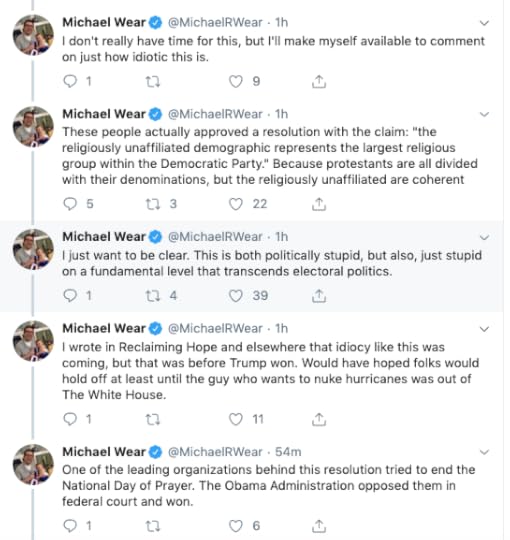
I have a pretty good idea what’s going to happen to religious Americans anywhere to the right of the late Rachel Held Evans should the Democratic Party take power. Read the signs.
Emma Green, who covers religion for The Atlantic, did a short, really informative video back in 2017, explaining why it really is true that the Democratic Party doesn’t get religion. This wasn’t always the case, she explains, but it is now:
Advertisement
August 29, 2019
Not Born This Way After All?
Well, here’s some science news, from the NYT:
How do genes influence our sexuality? The question has long been fraught with controversy.
An ambitious new study — the largest ever to analyze the genetics of same-sex sexual behavior — found that genetics does play a role, responsible for perhaps a third of the influence on whether someone has same-sex sex. The influence comes not from one gene but many, each with a tiny effect — and the rest of the explanation includes social or environmental factors — making it impossible to use genes to predict someone’s sexuality.
“I hope that the science can be used to educate people a little bit more about how natural and normal same-sex behavior is,” said Benjamin Neale, a geneticist at the Broad Institute of M.I.T. and Harvard and one of the lead researchers on the international team. “It’s written into our genes and it’s part of our environment. This is part of our species and it’s part of who we are.”
Did that quote make you go huh? I mean, the fact that it was the first quote in the story. Read on, and you’ll see why. For example:
Even before its publication Thursday in the journal Science, the study has generated debate and concern, including within the renowned Broad Institute itself. Several scientists who are part of the L.G.B.T.Q. community there said they were worried the findings could give ammunition to people who seek to use science to bolster biases and discrimination against gay people.
One concern is that evidence that genes influence same-sex behavior could cause anti-gay activists to call for gene editing or embryo selection, even if that would be technically impossible. Another fear is that evidence that genes play only a partial role could embolden people who insist being gay is a choice and who advocate tactics like conversion therapy.
“I deeply disagree about publishing this,” said Steven Reilly, a geneticist and postdoctoral researcher who is on the steering committee of the institute’s L.G.B.T.Q. affinity group, Out@Broad. “It seems like something that could easily be misconstrued,” he said, adding, “In a world without any discrimination, understanding human behavior is a noble goal, but we don’t live in that world.”
Discussions between Dr. Neale’s team and colleagues who questioned the research continued for months. Dr. Neale said the team, which included psychologists and sociologists, used suggestions from those colleagues and outside L.G.B.T.Q. groups to clarify wording and highlight caveats.
“I definitely heard from people who were kind of ‘why do this at all,’ and so there was some resistance there,” said Dr. Neale, who is gay. “Personally, I’m still concerned that it’s going to be deliberately misused to advance agendas of hate, but I do believe that the sort of proactive way we’ve approached this and a lot of the community engagement aspects that we’ve tried were important.”
You get all this spin before the story tells you much of anything about the actual scientific findings. And it goes on:
“As a queer person and a geneticist, I struggle to understand the motivations behind a genome-wide association study for non-heterosexual behavior,” wrote Joe Vitti, a postdoctoral researcher at the Broad Institute, in one essay. “I have yet to see a compelling argument that the potential benefits of this study outweigh its potential harms.”
Wait, hold on! A genetic scientist thinks there’s no reason to study whether or not a widely observed sexual behavior might have a basis in genetics? Another gay scientist, one who works at Broad, explained why he supported the research:
He concluded: “Saying ‘sorry, you can’t study this’ reinforces it as something that should be stigmatized.”
Read the whole story, which is pretty good overall. It quotes the scientist who, in 1993, claimed to discover a “gay gene,” saying that this new study wasn’t actually looking for a gay gene. I’m not sure about that conclusion. If I understand this study, it’s saying that researchers found no significant genetic cause for same-sex behavior. That is not to say that being gay is a “choice,” as we understand the word. The researchers conclude that environmental factors likely predominate. How can you fault a gay man or gay woman for having grown up in an environment that might have nurtured them towards same-sex desire? It seems from this study, “born this way” is inaccurate; “grew up to become this way” is more precise.
Here’s a link to the actual study, if you’d like to read it. And here’s a link to a NYT op-ed by two gay scientists who worked on the project. They say that there’s no doubt that genetics plays some role in homosexuality, but that it’s relatively small, and impossible to pin down. It’s nature and nurture — but mostly nurture. There is no single gay gene. You can’t test the genes of an unborn child and determine if he or she is going to be gay. Thank God! There will be no eugenic abortions over sexuality.
I actually have sympathy for the gay scientists who are nervous about this kind of research. I feel the same way about genetic research into race and intelligence. Given what human beings are, I worry about how those findings might be used politically. I get very, very anxious about that kind of research, and wonder if the potential down sides of knowing that information (that people of some ethnicities are more intelligent, on average, than people of other ethnicities) is worth the risks. That is, I believe that the concept of “forbidden knowledge” is valuable. It’s not unreasonable for the gay scientists to have the same concern. Still, if there was ever a safe period in which to do this particular science, it’s now.
About “forbidden knowledge,” I wrote a post on the topic some years back. In it, I quoted this from W.H. Auden:
“In our culture, we have all accepted the notion that the right to know is absolute and unlimited. The gossip column is one side of the medal; the cobalt bomb is the other. We are quite prepared to admit that, while food and sex are good in themselves, an uncontrolled pursuit of either is not, but it is difficult for us to believe that intellectual curiosity is a desire like any other, and to recognize that correct knowledge and truth are not identical. To apply a categorical imperative to knowing, so that, instead of asking, “What can I know?” we ask, “What, at this moment, am I meant to know?” — to entertain the possibility that the only knowledge which can be true for us is the knowledge that we can live up to — that seems to all of us crazy and almost immoral.”
Anyway, if homosexuality is primarily a matter of nurture, not nature, why is it wrong to let gay people who want to seek therapy in hope of reducing or eliminating same-sex desire undergo that treatment? This study undercuts the case against this kind of therapy, right? If same-sex desire is not genetically hard-wired, what’s wrong with the principle behind this therapy from a scientific point of view (as distinct from a moral or political one)? To be clear, I understand why one would object to this therapy on moral and political grounds, but this study seems to knock down a strong scientific objection to it.
Yes?
UPDATE: In the comments, some people have pointed out that someone might not have homosexuality in their genes, but could still be affected by factors in utero that predispose them to same-sex attraction. That would be biological, but not genetic, and not due to socialization or psychology. I appreciate the distinction being made.
Advertisement
Demonizing The Founders, Again
Step by baby step, we move closer than ever to demonizing the Founding Fathers. News about George Washington University:
Breitbart News reported in April that a majority of students participated in a referendum at George Washington University voted to end the use of the “Colonials” mascot. Of the 5,000 students that voted in the referendum, 54 percent voted against the continued use of the mascot. The university initially took no action on the vote, as late as two months after the petition the university still had “no comment” on the student’s demands.
Now, George Washington University has slowly started its process of removing the mascot from campus. In one example, the student center for registration and financial services was renamed from “Colonial Central” to “Student Services Hub.” [Photos here — RD]. A student organization that encourages students to attend university athletic events recently changed its name from “Colonial Army” to “George’s Army.” However, the organization claims that the recent referendum did not influence their decision to change the name.
This past spring, the student body voted to chuck the Colonials name as offensive, by a 54 percent majority. However, only one in five students even bothered to vote in the non-binding election. Yet this is an instructive point: a passive majority will be steamrollered by a woke, engaged vanguard. You may not care what the sports teams are named, but it’s an important symbol. If the word “Colonial” is considered too offensive, then the Colonial era and its eminent personages will be next. Eventually the university will change its name to RuPaul A&M.
Here’s a story from the GW student newspaper about the referendum, which called on the university to ditch “Colonials,” as it “glorifies an act of systemic oppression.” More:
Sophomore Andrew Hesbacher, a former Hatchet reporter who helped launch the petition, said he, Yakobashvili and junior Emma Krasnopoler were at a study abroad orientation in April when study abroad staff told them they should not wear any clothing with “Colonials” on it in any country outside of Europe because citizens of those countries would be offended by the history of the word.
“It’s very wrong for us to call ourselves an open and welcoming university when the name means such demise and terror for students who could possibly come here,” he said.
The hippo has been GW’s unofficial mascot for years since former University President Stephen Joel Trachtenberg brought the statue to campus in 2000.
Hesbacher said because of the hippo’s long-standing history at GW, it wouldn’t be a stretch to change the mascot, and students have been talking about changing the mascot for years. But he said it was time to make the change a focus instead of a “side conversation.”
“Colonialist, terrorist, murderer. In a lot of places that’s what colonials mean to people,” Hesbacher said. “Why would we continue to call ourselves that?”
Because, children, this is the United States of America, and the founding generations were colonists!
I know, I know, you laugh at this, but it’s all about imbuing the core identity of this country with moral stain. They’re training the next generations to hate America and what it stands for by institutionalizing national self-loathing.
Advertisement
Rod Dreher's Blog
- Rod Dreher's profile
- 503 followers



